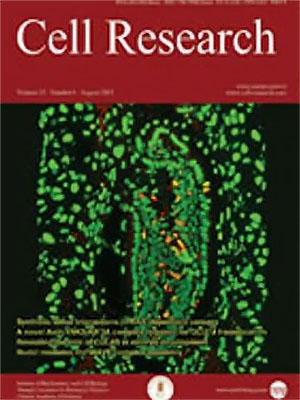
Volume 13, No 2, Apr 2003
ISSN: 1001-0602
EISSN: 1748-7838 2018
impact factor 17.848*
(Clarivate Analytics, 2019)
Volume 13 Issue 2, April 2003: 130-140
ORIGINAL ARTICLES
Isolation and functional characterization of the C-terminus of rice phosphatidylinositol 4-kinase in vitro
Xiang Feng KONG1, Zhi Hong XU1 and Hong Wei XUE1
1National Laboratory of Plant Molecular Genetics, Institute of Plant Physiology and Ecology, Shanghai Institutes for Biological Science (SIBS),The Chinese Academy of Sciences; Partner Group el Max-Planck-Institute of Molecular Plant Physiology (MPI-MP) on "Plant Molecular Physiology and Signal Transduction", 300 Fenglin Road, 200032 Shanghai, China
Correspondence: Hong Wei XUE(hwxue@iris.sipp.ac.cn )
A partial rice (Oryza sativa L.) cDNA clone, OsPI4K1c, was isolated through screening of a cDNA library constructed from tillering materials. OsPI4Klc encoded a peptide of 608 amino acids with a calculated molecular mass of 68.4 kDa. The OsPI4Klc peptide shared high homology and possessed the highly conserved domains present in most isolated cloned P14-kinases, i.e. a lipid kinase unique (LKU) domain and a catalytic (CAT) domain. A region with similarity to pleckstrin homology (PH) domain was present in OsPI4Klc as well. Further comparison with genomic sequences in databases revealed that OsPI4K1c is located at the 3'-end of a putative rice PI 4-kinase coding gene OsPI4K1, and its coding region corresponded to the C-terminal half of OsPI4K1 protein. Twelve exons (49-562 bp in size) and 11 introns (77-974 bp in size) were identified in OsPI4K1c. The recombinant protein expressed in Escherichia coli phosphorylates phosphatidylinositol at the D4 position of the inositol ring. OsPI4K1 transcript levels were detected in a low but constitutive manner in shoot, stem, leaf, spike and root tissues and did not change upon treatment with different hormones, calcium and jasmonic acid (JA). However, treatment with salicylic acid (SA) elevated the mRNA level of the OsPI4K1 gene, which suggested the involvement of OsPI4K1 in wounding responses.
FULL TEXT | PDF
Browse 2063


